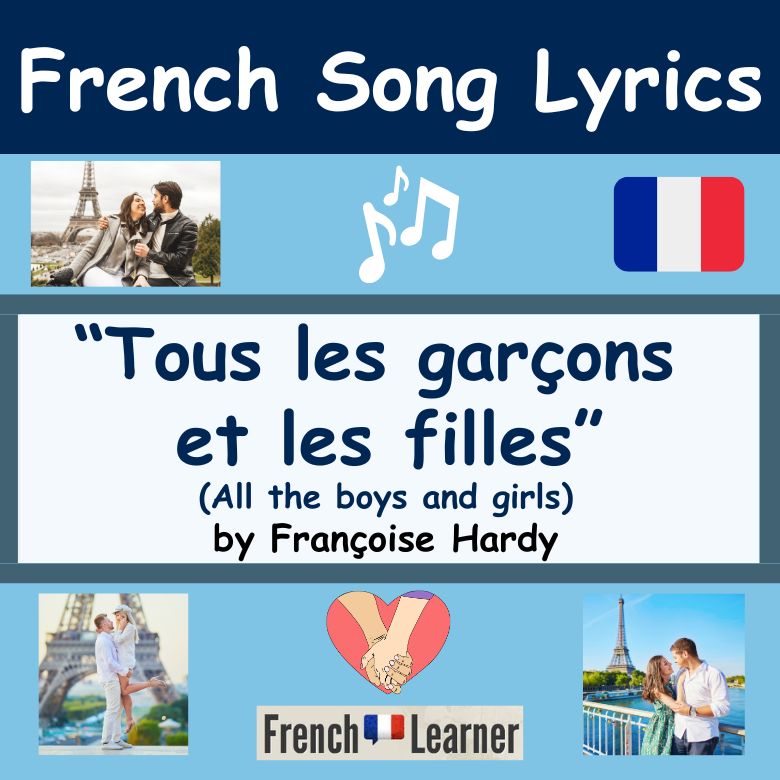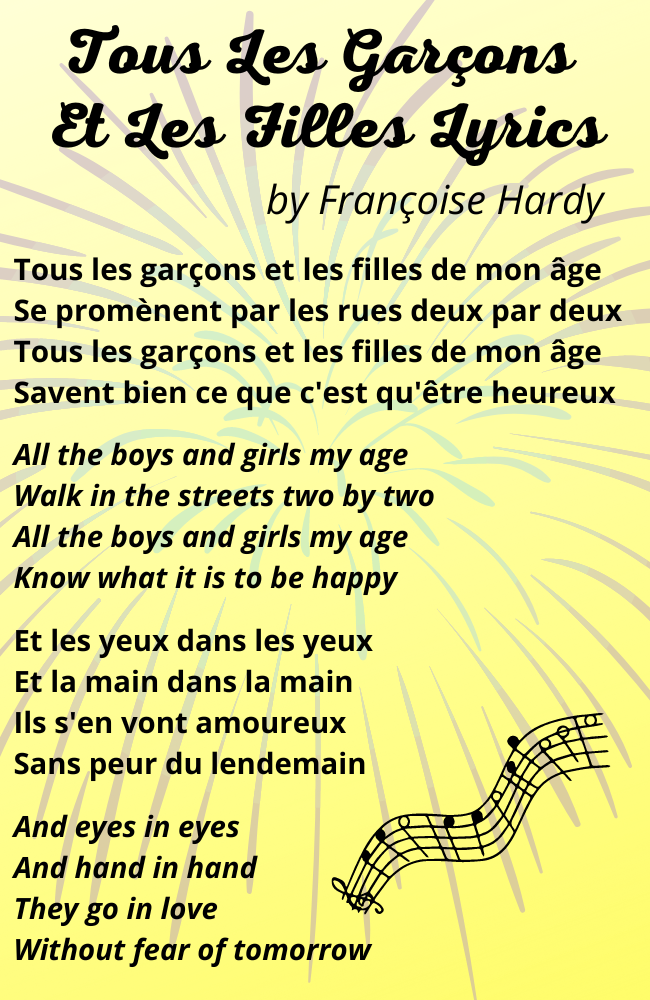“Tous Les Garçons Et Les Filles“ (Meaning: All the boys and the girls; Pronunciation: tu le fij e le gaʀsɔ̃) is a song by French singer Françoise Hardy (1944-1924). Released in 1962, the song became a major hit in the French-speaking world. The song is about an adolescent feeling alone in the world and envious of other young and happy couples. Below we thoroughly explain the lyrics’ vocabulary and grammar in detail.
This post is dedicated to my high school French teacher, Madame Susan Smith (1947-2009) of Oyster River High School, Durham, New Hampshire.

Song synopsis
The overall theme of the song, “Tous Les Garçons Et Les Filles” is the emotional struggling of an adolescent lacking romantic companionship and admiring her peers. Hardy sings about walking alone (Oui, mais moi, je vais seule; Yes, but me, I go alone), admiring hear pears who walk as couples (Ils s’en vont amoureux; They go in love).
By the end of the song, she asks when she’ll find such love (Je me demande quand viendra le jour; J’aurai quelqu’un qui m’aime; I wonder when the day will come; [when] I’ll have somebody who loves me).
Listen To Tous Les Garçons Et Les Filles
The following YouTube video for “Tous Les Garçons Et Les Filles” has over three million views.
You can also listen on Spotify:

Lyrics Analysis
In the following section we’ll explore the lyrics to this song in depth, analyzing the both the vocabulary and grammar line-by-line.
Tous les garçons et les filles de mon âge, Se promènent par les rues deux par deux
The first two lines translate to “All the boys and girls my age, Walk in the streets two by two”. The word “tous” means “all”. There are four forms of “tous” depending on number and gender. “Tous” is used for the masculine-plural form. Fille in French can translate to “girl” or “daughter”.
The reflexive verb “se promener” means “to walk” or “to stroll”. Hence, “Je me promène” means “I walk” or “I stroll”.
The expression “Deux par deux“ means “two a time” or “in pairs”.
Savent bien ce que c’est qu’être heureux
This line translates to “Know what it is to be happy”. “Savent” means “they know” and comes from the verb “savoir” (to know). There are several ways to say “to know” in French.
“Heureux/heureuse“ are one of multiple ways to say “happy” in French. The words “ce que” means “what” and are an indefinite relative pronoun.
Et les yeux dans les yeux, Et la main dans la main
These two lines translate to “And eyes in eyes, And hand in hand”. The word for “eye” in French is interesting as “un oeil“ means “an eye” and “les yeux” means “eyes”.
Ils s’en vont amoureux, Sans peur du lendemain
These two lines translate to “They go in love, Without fear of tomorrow”. The reflexive verb “s’en aller“ means “to go”, “to go way” and “to leave”.
The noun “peur“ means fear. While “lendemain“ translates to “the next day”, we translated it loosely to “tomorrow”, which is really “demain”.
Oui, mais moi, je vais seule, Par les rues, l’âme en peine
These lines translate to “Yes, but me, I go alone, In the streets, a lost soul”. The adjective “seule(e)“ means “alone” and adverb “seulement” means only. The preposition “par“ means “by” but can also translate to “via” or “in”.
The noun “âme” means “soul” and “peine” means “sorrow” or “pain”. The entire expression, “âme en peine“ means “lost soul”.
Car personne ne m’aime
This line translates to “because nobody loves me”. “Car” is a literary way of saying “because” in French. “Personne” means “nobody” or “anybody” and is a French negation. “Je ne vois personne”, for example, means “I don’t see anybody.
Mes jours, comme mes nuits, Sont en tous points pareils
These two lines translate to “But days, like nights, Are all the same”. The sentence, “Les jours et les nuits sont des points pareils”. The relative pronoun “en“ replaces “des points pareils”. There are two ways to say “same” in French: “pareil” and “même“.
Sans joies et pleins d’ennuis
This line translates to “Without joy and full of boredom”. The preposition “sans” means without and noun “joie” means “joy”. The noun “ennui“ has multiple meanings including “trouble”, “problem” and “boredom”.
Personne ne murmure : “Je t’aime” à mon oreille
These two lines translate to “Nobody whispers to me: “I love you” in my ear”. The verb “murmurer“ means “to murmur” or “to whisper”. “I love you” in French is “Je t’aime“.
Font ensemble des projets d’avenir
This line translates to “Make plans together for the future”. “Font” is the third-person plural (ils/elles) form of “faire” (to make, to do). The expression, “faire des projets” means “to make plans”. The noun “projet“ means both “project” and “plan” in French. There are two ways to say “future” in French: “l’avenir” and “le futur”.
Savent très bien ce qu’aimer veut dire
This line translates to “Know very well what ‘to love’ means”. The expression “vouloir dire” translates literally to “to want to say” but really means, “to mean”. For example, “Que veut dire + noun?” translates to “What does noun mean?”. This page covers the verb “vouloir“ (to want) in detail.
Quand donc pour moi brillera le soleil ?
This line translate to “When therefore will the sun shine for me?”. This page explores the two ways to say “when” in French: “quand” and “lorsque”. “Brillera” is the future tense of the verb “briller” to shine. “Donc“ translates to “therefore” or “thus”.
Comme les garçons et les filles de mon âge
This line translates to “Like the boys and girls my age”. The French word “comme“ translates to both “like” and “just like” and “just as”.
Connaîtrais-je bientôt ce qu’est l’amour ?
This line translates to “Will I soon know what love is?”. “Connaîtrais-je” is the inversion form of the question “Est-ce que je Connaîtrais?. The literal translation of “connaîtrais” is “I would know”. This is in the conditional (would) tense. However, we translate it to “will know” as this better fits the context of the lyrics.
Je me demande quand viendra le jour
This line translates to “I wonder when the day will come”. The verb “demander“ means to ask. In the reflexive form, “se demander” it means “to wonder”. “Viendra” is the future tense of “venir“ (to come).
Où les yeux dans ses yeux
This line translates to “When eyes in eyes”. The word “où” translates to both “where” and “when”. In the context of a relative pronoun, for example “the day when”, “où” is used. For example, “Le jour où nous nous sommes mariés” (they day when we got married).
J’aurai le cœur heureux
This line translates to “I’ll have a happy heart”. “Aurai” means “will have” and is the future tense of the verb “avoir” (to have).
Le jour où je n’aurai, Plus du tout l’âme en peine
These two line translate to “The day when I will no longer have, A lost soul”. The negation form “ne + verb + plus” means “to no longer”. For example, “Je ne mange plus le fromage” means “I no longer eat cheese” or “I don’t eat cheese anymore”.
Le jour où moi aussi, J’aurai quelqu’un qui m’aime
These two lines translate to “The day when I too, Will have somebody who loves me”. The word “moi“ means “me” and the “m'” can translate to “to me”, “at me” or simply “me”.
Tous Les Garçons Et Les Filles French Lyrics & English Translation
Tous les garçons et les filles de mon âge
Se promènent par les rues deux par deux
Tous les garçons et les filles de mon âge
Savent bien ce que c’est qu’être heureux
All the boys and girls my age
Walk in the streets two by two
All the boys and girls my age
Know what it is to be happy
Et les yeux dans les yeux
Et la main dans la main
Ils s’en vont amoureux
Sans peur du lendemain
And eyes in eyes
And hand in hand
They go in love
Without fear of tomorrow
Oui, mais moi, je vais seule
Par les rues, l’âme en peine
Oui, mais moi, je vais seule
Car personne ne m’aime
Mes jours, comme mes nuits
Sont en tous points pareils
Sans joies et pleins d’ennuis
Personne ne murmure :
“Je t’aime” à mon oreille
Yes, but me, I go alone
In the streets, a lost soul
Yes, but me, I go alone
Because nobody loves me
But days, like nights
Are all the same
Without joy and full of boredom
Nobody whispers to me:
“I love you” in my ear
Tous les garçons et les filles de mon âge
Font ensemble des projets d’avenir
Tous les garçons et les filles de mon âge
Savent très bien ce qu’aimer veut dire
All the boys and girls my age
Make plans together for the future
All the boy and girls my age
Know very well what “to love” means
Et les yeux dans les yeux
Et la main dans la main
Ils s’en vont amoureux
Sans peur du lendemain
And eyes in eyes
And hand in hand
They go in love
Without fear of tomorrow
Oui, mais moi, je vais seule
Par les rues, l’âme en peine
Oui, mais moi, je vais seule
Car personne ne m’aime
Mes jours, comme mes nuits
Sont en tous points pareils
Sans joies et pleins d’ennuis
Quand donc pour moi brillera le soleil ?
Yes, but me, I go alone
In the streets, a lost soul
Yes, but me, I go alone
Because nobody loves me
But days, like nights
Are all the same
Without joy and full of boredom
When therefore will the sun shine for me?
Comme les garçons et les filles de mon âge
Connaîtrais-je bientôt ce qu’est l’amour ?
Comme les garçons et les filles de mon âge
Je me demande quand viendra le jour
Like the boys and girls my age
Will I soon know what love is?
Like the boys and girls my age
I wonder when the day will come
Où les yeux dans ses yeux
Et la main dans sa main
J’aurai le cœur heureux
Sans peur du lendemain
Le jour où je n’aurai
Plus du tout l’âme en peine
Le jour où moi aussi
J’aurai quelqu’un qui m’aime
When eyes in eyes
And hand in hand
I’ll have a happy heart
Without fear of tomorrow
The day when I will no longer have
A lost soul
The day when I too
Will have somebody who loves me

